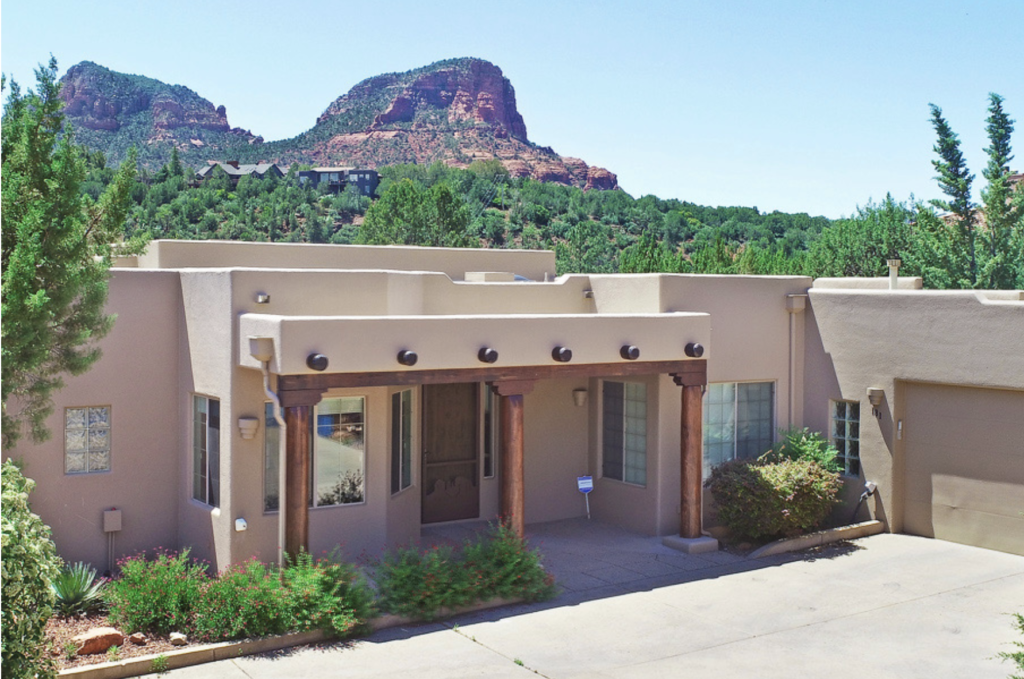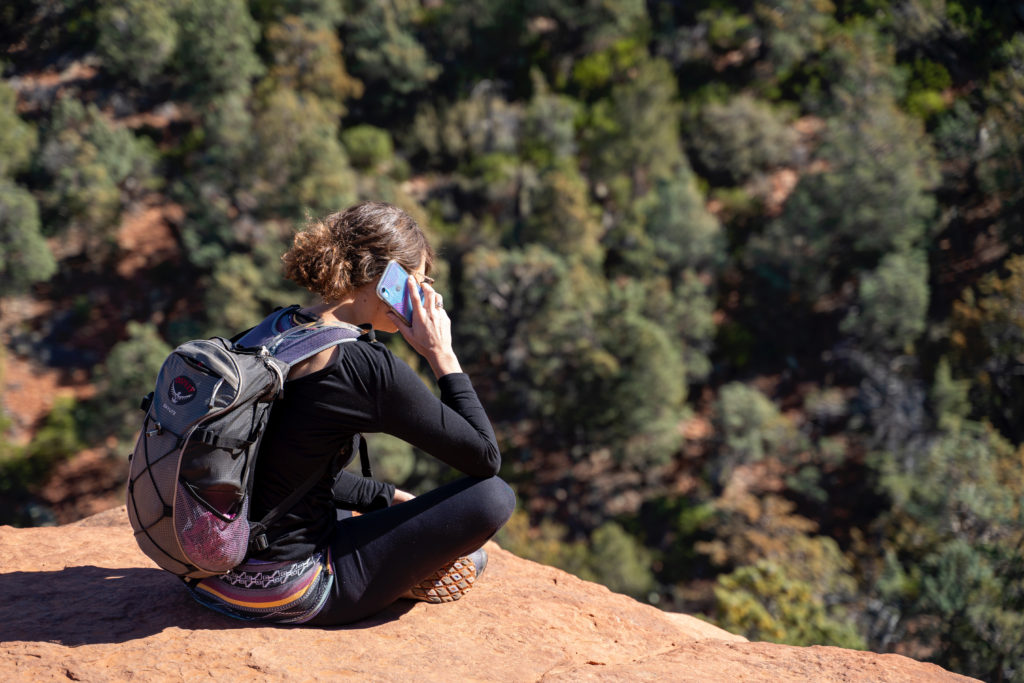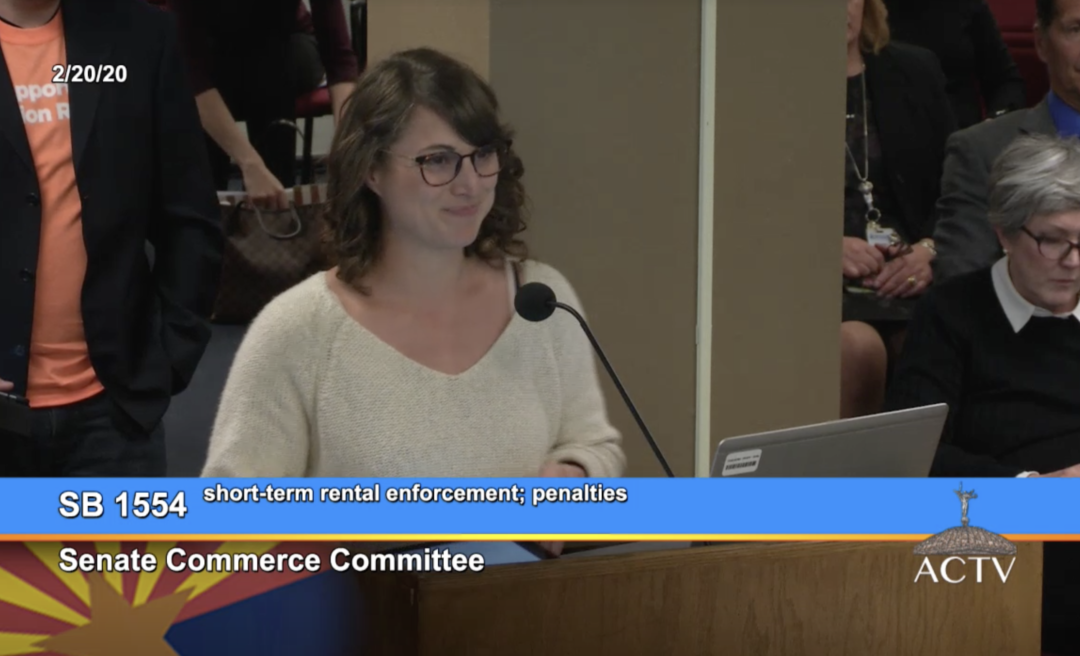Updated 2023: Sara, now Sara First, is now a board member of Arizonans for Responsible Tourism, a statewide association built by her and other Arizona STR advocates. After this story was published, the 2020 AZ legislative session was interrupted due to Covid. AZRT later advocated for compromise bill SB1168, which passed in 2022. Learn more about AZRT and SB1168 here.
“I’ve lived in Sedona for over 10 years and believe the introduction of short-term rentals was the best thing that happened in Sedona,” said Sara Alper to the Arizona Senate Commerce Committee on February 20. “Finally, a breath of fresh air in the community.”
The committee was considering SB1554, which would allow a local government to restrict a short-term rental (STR) or vacation rental that is not a person’s primary or one additional residence. The bill would put the livelihoods of thousands of people like Sara at risk.
Her start-up, Sarazona, manages between 40 and 50 properties, most of which are the homes of part-time residents who rent out their properties to short-term guests for supplemental income when they aren’t in the area. She loves every aspect of her job, particularly the activities that flex her entrepreneurial and creative muscles, like staging the homes, working for herself (often from her phone while hiking the many nearby trails), and forming close relationships with vendors throughout Sedona. She estimates her business supports as many as 100 local contractors.

A One-Sided Conversation
Sara traveled to Phoenix to testify against the bill because she had been watching and speaking up in the conversation locally, but she felt like no one was listening.
“No one knows Sedona vacation rentals better than I do, and I just got tired of hearing people spreading misinformation,” she said. She compared the rampant spread of misinformation to the kids’ game of telephone, citing an example of a trash can being left out one night too long, becoming a dramatized story about trash piling up at a property for a year.
She also felt like too few others were speaking up. “I don’t think anybody thinks about how cool the community has gotten in the last two years,” she said. “People my age take that for granted, and they don’t realize this is happening because of vacation rentals.”
Read more: Linda Curry: Setting the standard for Arizona short-term rentals
Sedona’s Next Generation
Sara is 34 and a part of a growing community of people under 55 and an ecosystem of entrepreneurs blossoming around the opportunities STRs provide, the literal and figurative next generations Sedona needs.
Its reemergence into the travel spotlight in recent years has led many to think (and claim) Sedona is a retirement community “overrun” by tourists, but tourism – and vacation rental homes – were Sedona’s first industry long before it became a retirement haven.
In the early 1900s, soldiers, miners, and smelters from nearby camps and towns would vacation there for fishing and relaxation. Then, as cars and other transportation proliferated in the 30s and the post-WWII leisure time increased, tourism to Sedona skyrocketed. To meet this demand, locals built cabins along the highways and the popular Oak Creek for overnight stays.
It wasn’t until the second tourism boom and major redevelopment in the 1970s that Sedona landed on the map as a retirement hotspot. Today, the area has a population of around 10,200 people whose median age is 61. (By comparison, the national median age is 38.) Still, tourism, accommodations, and food service remain the community’s strongest industry, and tourism dollars subsidize critical services like the Sedona Fire District.
Sara herself moved there 12 years ago to enjoy the area’s natural terrain and atmosphere. Like her, most of her guests take to Sedona for hiking and mountain biking. Many of them could not have visited without STRs, including families with parents working remotely and those who need kitchens, multiple bedrooms, and yards.
The former showcases a larger trend in travel and work-life balance that Sara cares more about than the need for an income: widespread access to the internet now enables people to work from anywhere, allowing for more intergenerational travel and happier, healthier work lives. “This is helping make life better, and this is how we create community.”

This much-needed community is due in large part to short-term and vacation rentals. New businesses have sprung up, like restaurants, tour operators, and gear providers like bike rental shops. Travel experience hosting, too, has enabled countless side jobs for everyone, including retirees. Her 70-year-old friend plans to teach cooking classes to visitors to supplement her retirement.
A Search for STR Solutions?
The properties Sara manages have never received a complaint from neighbors, largely due to her stringent guest vetting practices. She requires government-issued IDs and accepts only guests who have received five-star reviews from all previous hosts. She also watches out for red flags like requests for discounts last minute, questions about airbeds and sofa beds, young bookers, and anyone who mentions a party.
Sara has even offered to the city of Sedona that she teaches free classes to other STR hosts on how to vet and host great guests.
“I love Sedona. I love our mayor, our city council, our chamber of commerce,” she stressed. “I just think it’s funny that instead of looking for solutions to something that’s probably not going to change, they’re still trying to go back in time. Since when has that worked?”
If SB1554 passes in its current state and should Sedona subsequently enact misinformed and short-sighted overregulation of STRs, its economy would suffocate.
For Sarazona’s property owners who rely on the income of STRs to be able to live in their Sedona homes for part of the year and for whom long-term rentals would not be an option, she said they would likely have to sell their properties, which would severely hurt the real estate market.
Even worse, Sara and many like her would likely have to leave – and take their tax base with them. “A lot of people my age who have started businesses would probably go out of business and move away from Sedona,” she said. “It would be really sad for the community.”
Read more: Fair Treatment: 24-Year-Old Phoenix STR Host Asks Ariz. Legislators to Protect His Property Rights
•••
SUBSCRIBE TO GET UPDATES



